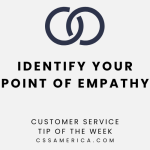
I’ve purchased from many different online organizations both personally and professionally over the years, as I assume most of you have, as well. And the ones I tend to go back to are those that make a good impression from a customer service standpoint. While that’s probably no surprise to you, what may be a surprise is how I and many others evaluate the customer service of online businesses.
Three online companies that have been great in those customer service encounters are Constant Contact, Zoho, and Zappos. These are three pretty different businesses, but the positives from my experiences with them have been similar.
First, they’re responsive to e-mails. Since I deal with Zoho quite frequently on important but non-urgent matters, I contact them via e-mail. They respond fast. They try to resolve before responding, but – if not – they’ll follow-up to let you know what investigation is taking place and by when they expect to resolve the issue or need.
Next, for these online companies, they’re great…on the PHONE! I’ve called all 3 businesses, and they pick up quickly, the representatives are consistently patient with me, and their personalities and tone are cheery and personable. With Constant Contact, they will let you know what can and can’t be done, and they ask you specific questions to give you specific answers to arrive at the holy grail of…FIRST CALL RESOLUTION – woo hoo!!
Finally, there’s a consistent theme of relaxed professionalism from website to e-mail to calls. No matter how you contact them, you get a consistent experience. They’re professional without being stuffy. They’re fun – a Zappos order receipt seems like a joyous (and abundantly clear) message from a friend about your purchase. Zoho doesn’t ask you to complete their Likert scaled survey, they give you the happy/sad face emojis to quickly rate the experience.
If you’re in a web-based business, to be a great online, be great at offline customer service. If you want to be part of a great business – one known for its customer service – don’t ignore all the different ways that your clients experience your customer service.
Be great no matter how they engage you.
Signup for FREE Tips! Contact Us More Resources for You Visit Our Home Page























